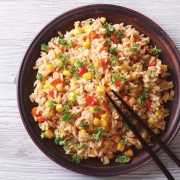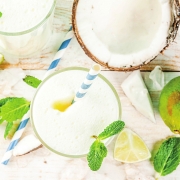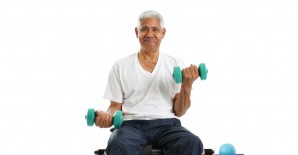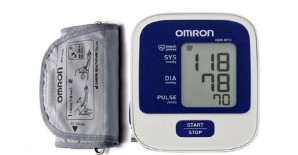
Health
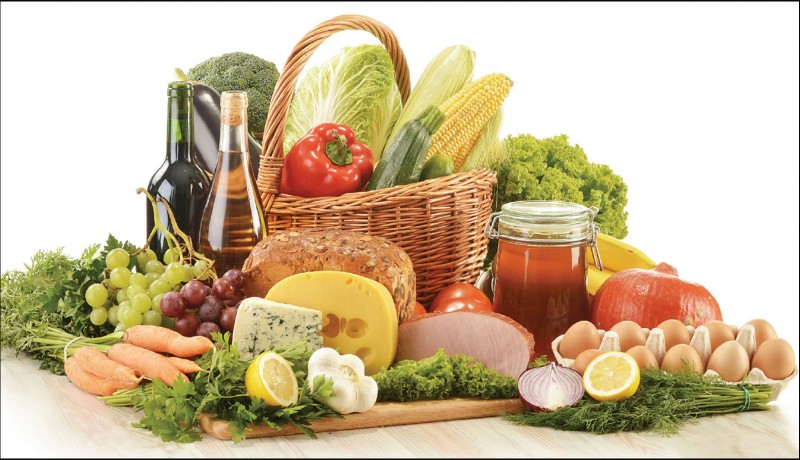
Wellness consultant Naini Setalvad recommends foods that help you manage menopause
Suffering from frequent night sweats, panic attacks, irritability, mood swings, forgetfulness, hot flashes, insomnia and other similar symptoms? Welcome to the world of menopause, a phase that comes with its own body cycle and thermostat. Life during and after menopause is often described as sweaty, itchy, bloated, weepy and leaky! It’s a time when weight gain, body and joint pains, constipation, palpitations, vaginal dryness, decreased sex drive, hair fall and dull skin can drive you up the wall and sometimes prevent you from dealing with your day-today activities.
While many claim that one needs to slow down during this phase, I call it ‘ME–NO–PAUSE’: ‘No pause for me’. This phase may be challenging but it is normal; you just need to take charge of your life, incorporate the required changes and add vitality to your body. Indeed, your diet can play a major role in helping you deal with menopause—incorporating the right foods can help you undergo this transition smoothly. For instance, foods that contain phytoestrogens are a must; these are plant hormones with a similar structure to estradiol (the major female sex hormone), as are bioflavonoids (a class of powerful phytochemicals) contained in fruits and herbs.
Here’s what you should include in your diet
- Flaxseeds: Flaxseeds are an important source of good quality fats. They are rich in phytoestrogens that reduce the menopausal syndrome and improve the health of bones, hair and skin owing to their mild oestrogenic action. Phytoestrogens are also available in white butter, sesame seeds and vegetables such as beetroot, carrot, peas, beans and yam.
- Fruits and spices: Some fruits such as strawberries are rich in bioflavonoids and are also an abundant source of phytoestrogens. Local fruits such as mango and papaya have them too! Other sources of bioflavonoids are garlic, spinach, red bell peppers and tea. The Indian masala dabba is a treasure trove of spices; the most commonly used condiments such as fenugreek seeds, mustard seeds, cinnamon, cloves, turmeric and red chilli powder contain a good amount of phytoestrogens that ease out the menopausal syndrome and make your life easier.
- Coloured foods: Red, yellow, orange and green coloured foods are filled with antioxidants that act as soldiers, protecting your body from damage by free radicals that come with air pollution, junk food, chemicals, pesticides, and stress and a poor lifestyle. Free radicals get attached to healthy cells and lower your immunity. Add carrots, pumpkins, tomatoes, peppers, leafy greens, watermelons, mangoes and other coloured foods to your diet to help you through this phase.
- Coconut: Coconut is revered as a superfood and its oil is often termed ‘miracle oil’. Rightly so, as it is very effective in treating hot flashes and skin problems. The fat derived from the coconut helps enhance sexual intercourse for seniors. The easiest way to have it daily is to add a tablespoon of grated coconut in your soup, salad or vegetables.
- Pumpkin seeds: Pumpkin seeds are excellent during menopause as they are high in zinc and Vitamin E, which help women build up hormones that activate their sexual organs. The seeds are loaded with libido-enhancing vitamins and minerals that increase the flow of sexual fluid in the body. Pumpkin seeds also increase HDL (good) cholesterol and decrease blood pressure, headaches, hot flashes, joint pains and many other symptoms that affect the body adversely. Take a teaspoonful of these seeds every day to keep all these problems at bay.
- Nuts: Nuts and seeds are rich in essential fatty acids and omega-3 acids. Peanuts are a rich source of Vitamin E and are linked to a healthy heart. Considered a superfood, the fatty acids in walnuts assist in preventing hot flashes and mood swings. They are also vital in producing prostaglandins—a group of compounds with varying hormone-like effects.
- Ghee: I love calling ghee ‘liquid gold’. Just as gold has its monetary value, ghee has its nutritional value, especially cow’s ghee that is recommended for your daily diet. Ghee prevents back, knee and joint pains as well as vaginal dryness and lubricates the joints. It improves pre and postmenopausal problems related to mood, memory and digestion. This amazing liquid also works as a brilliant antidote.
- Balanced diet: It is essential to control and maintain one’s blood sugar levels during and after menopause. Low levels of blood sugar can cause palpitations, memory loss, irritability and fatigue whereas high levels can lead to the onset of diabetes. It is common for blood sugar levels to shoot up during menopause so you need to be very careful. Eat a balanced diet comprising green leafy vegetables, protein and fats regularly to achieve a healthy blood sugar level.
Apart from tweaking your diet, you also need to get some fresh air and sunlight coupled with exercise, deep breathing and positive thinking.
Avoid these foods during menopause
- Salt: Prevention is always better than cure so ensure you stay away from processed foods that contain very high levels of salt.
- Caffeine/aerated drinks: A standard rule for all menopausal women is to reduce or completely abstain from caffeine or aerated drinks. The stimulations in any caffeine drink are associated with an increase in hot flashes. If you absolutely require caffeine in your daily diet, have it an hour before or after your meals. Having it with your meals can have a binding effect on minerals that prevent them from getting absorbed.
- Alcohol: Women should generally abstain from alcohol as their bodies are not equipped to deal with it. They have a lower percentage of body water that impairs their ability to dilute liquids in the body. Hormones also play a major role as they allow the body to get intoxicated faster and oestrogen slows down the elimination of alcohol content from the body.
Must-dos during menopause
- Menopausal women have a higher chance of hypertension. So add potassium-rich foods like tomato, spinach, orange, banana and lemons to your diet to lower your blood pressure levels.
- Keep a check on your vitamin and mineral levels regularly so they are at optimal amounts and your body functions normally.
- Have a blood test every six months and consult your physician who can suggest additional supplements if required.
RECIPES TO KEEP YOU HEALTHY DURING MENOPAUSE
PEANUT SAUCE RICE
Ingredients
- Rice: 150 gm; raw
- Green capsicum: 50 gm; cut into long strips
- Red capsicum: 50 gm; cut into long strips
- Yellow capsicum: 50 gm; cut into long strips
- Cucumber: 100 gm; cut into long strips
- Extra virgin olive oil: ½ tsp
- Salt to taste
For peanut sauce
- Peanut butter: 5 tbsp
- Water: 4 tbsp
- Red chilli flakes: ¾ tsp
- Red chilli powder: ½ tsp
- Jaggery: 1 tbsp
Method
Cook the rice, put in a bowl and set aside. Pour extra virgin olive oil in a wok and sauté the red, yellow and green capsicums and cucumber in it. Add cooked vegetables to the bowl of rice. Then add salt and peanut sauce and mix well. Serve hot.
For peanut sauce
Add water, red chilli flakes and red chilli powder to the peanut butter. Then add jaggery and mix well. Put this mixture in a wok and cook on high flame. When it becomes a thick paste, take it off the flame.
BEETROOT DIP
Ingredients
- Beetroot: 200 gm
- Lemon juice: ½ tbsp
- Garlic paste: ½ tsp
- Walnuts: 5 tsp; crushed
- Salt to taste
Method
Boil the beetroot and mash it till it becomes a smooth paste without any lumps. Add lemon juice, garlic paste, crushed walnuts and salt and mix well. Chill and serve with vegetable crudités.
COCONUT & ROSEWATER PUNCH
Ingredients
- Coconut water (of 1 coconut)
- Coconut cream: 1 tsp
- Rosewater: 4 tbsp
- Lemon juice: ½ tsp
- Mint leaves for garnishing
Method
Blend the coconut water, cream, rosewater and lemon juice in a blender. Garnish it with mint leaves and serve chilled.
Setalvad is an obesity and lifestyle disease consultant who offers diet counselling at Health for You, a wellness clinic in Mumbai, as well as online. Visit www.nainisetalvad.com for more details or write to contact.us@harmonyindia.org if you have any queries for her
Photos: 123RF.com Featured in Harmony — Celebrate Age Magazine March 2018
you may also like to read
-
Hot tea!
If you enjoy sipping on that steaming hot cup of tea, think twice. New research establishes a link between drinking….
-
Weight and watch
If you have stayed away from lifting weights at the gym, thinking it might not be a good idea for….
-
Toothy truth
Research has established a clear association between cognitive function and tooth loss when cognitive function score was categorised into quintiles…..
-
PRODUCT OF THE MONTH
Automatic Blood Pressure Monitor Measure your blood pressure and pulse rate with no fuss Hypertension, or high blood pressure, could….



